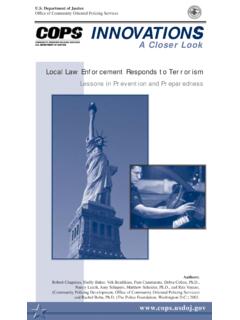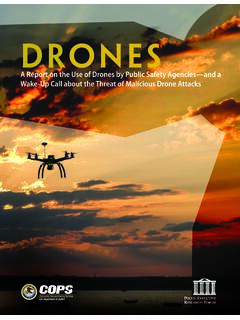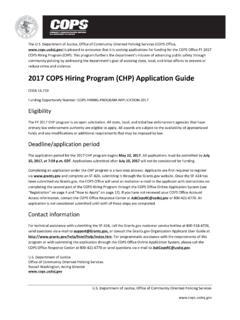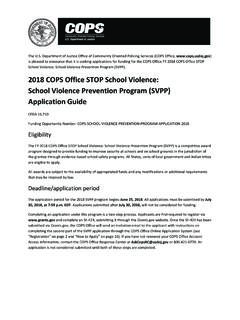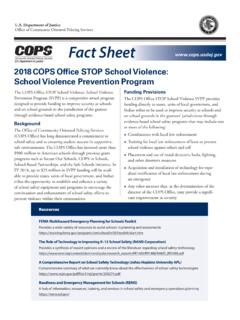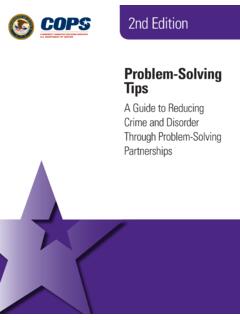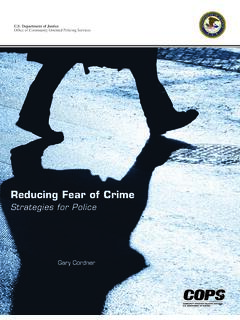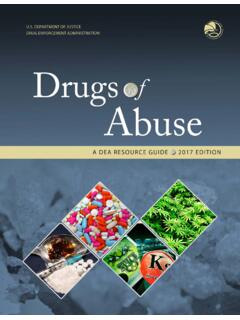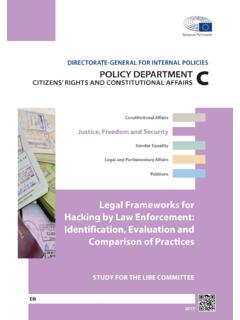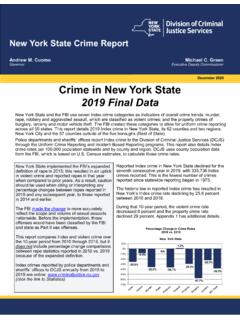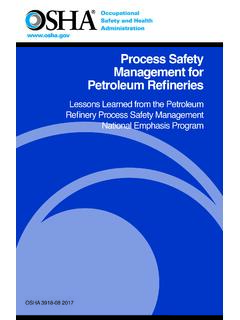Transcription of Law Enforcement Offcer Suicide - COPS OFFICE
1 Law Enforcement Offcer Suicide 2020 report TO CONGRESS Law Enforcement Offcer Suicide 2020 report TO CONGRESS The Internet references cited in this publication were valid as of the date of publication. Given that URLs and websites are in constant flux, neither the author(s), the contributor(s), nor the COPS OFFICE can vouch for their current validity. The Department of Justice reserves a royalty-free, nonexclusive, and irrevocable license to reproduce, publish, or otherwise use the work for Federal Government purposes and to authorize others to do so. This resource may be freely distributed and used for noncommercial and educational purposes citation: Spence, Deborah L., and Jessica Drake. 2021. Law Enforcement Suicide : 2020 report to Congress. Washington, DC: Department of Justice. Published 2021 This report responds to Senate report 116 127 accompanying the Consolidated Appropriations Act, 2020 ( 116 93). The Senate report language states the following: Review of Law Enforcement Mental Health and Wellness Programs.
2 The Committee recognizes the psychological and emotional impacts law Enforcement face in responding to stressful and traumatic situations and is disturbed by increased reports of suicides by current and former law Enforcement offcers. The Committee directs the Department to provide a report within 90 days of enactment of this act assessing the availability of existing mental health resources for law Enforcement agencies and should also include recommendations for increased access to, and utilization of, mental health counseling and programs focused on law Enforcement Suicide prevention efforts. This report shall also review the effciency and effectiveness of peer responder programs for sworn and non-sworn law Enforcement employees, including train the trainer models designed to support employees in the wake of a personal or professional crisis. This report should provide a review of the effectiveness of partnerships between peer responder programs and mental health service providers who specialize in clinical psychology services and behavioral sciences.
3 The report should include any additional programs or resources needed to assist the Department in its efforts to aid State and local law Enforcement agencies in developing and implementing law Enforcement Suicide prevention programs. [..] First Responders. The Committee is concerned about the increasing number of suicides among frst responders. Due to this increasing prevalence, the Committee directs the Department of Justice within 90 days of enactment of this Act to submit a report on the feasibility of establishing an evidence-based behavioral health program for police and fre departments and other frst responders that provides adequate training to identify warning signs of depression, stress, Post Traumatic Stress Disorder, and other mental and behavioral health conditions that the specifc population is experiencing. The report should specifcally identify how peer-to peer assistance, mental health check-ups, time off after responding to a critical incident, and family training will help ensure the resiliency and health of frst responders and police offcers.
4 This report assesses the availability of existing mental health resources for law Enforcement agencies; it provides a review of peer responder programs and makes recommendations for establishing evidence-based behavioral health and Suicide prevention efforts for both law Enforcement and other frst responders as requested by the Committee. Introduction In the 2010s, Suicide was the 10th leading cause of death in the United In 2018, more than 48,000 Americans died by Suicide , half of those using a Although some segments of the population have higher rates of Suicide than others, no part of our society is immune. In the 2017 National Survey on Drug Use and Health, percent of adults reported serious thoughts of Suicide in the past As part of the fiscal year (FY) 2020 appropriations process, the Senate report on the appropriations bill expressed that the Congress is disturbed by increased reports of Suicide by current and former law Enforcement officers.
5 4 According to Blue , a nonprofit dedicated to acknowledging the service and sacrifice of law Enforcement officers we lost to Suicide , 5 the last three years have seen an increase in reported cases of death by Suicide in the law Enforcement profession. Their data collection efforts reported 168 deaths in 2017, followed by 172 in 2018 and 228 in In all cases, these numbers exceed the number of line-of-duty deaths for those same years. But is this evidence of an increasing crisis in the law Enforcement profession? Many commentators within law Enforcement think even these numbers undercount the true extent of the problem; the increases Blue is reporting may actually be a function of improving awareness of that organization and the need not to hide these tragic deaths. As was discussed in the Law Enforcement Mental Health and Wellness Act: report to Congress (LEMHWA report to Congress) and in much of this other literature, most law Enforcement officers are working-age men a group known to have higher rates of death by Suicide than the population at large.
6 So it is important to remember that the extent to which Suicide risk is a function of occupation is not yet known. A number of recent studies suggest that the national Suicide rate has been increasing in the last 20 years. Since 1999, half of all states have seen 30 percent increases in Suicide rates, and all but six had significant If officer deaths by Suicide are increasing, it could be part of this general societal trend. However, given the high exposure to stress and trauma, the plethora of other conditions for which officers seem to be at high risk (including post-traumatic stress disorder [PTSD], depression, anxiety, cardiovascular disease, and addiction), and officer access to firearms, we cannot assume the occupational factors do not matter. At least one study has suggested that suicidal ideation is more prevalent among law Enforcement officers than the general 1. Jiaquan Xu et al., Mortality in the United States, 2018. NCHS Data Brief 355 (January 2020).
7 2. WISQARS (Web-based Injury Statistics Query and Reporting System), Leading Causes of Death Reports, 1981 2018, Centers for Disease Control and Prevention, last modified February 20, 2020, 3. Jonaki Bose et al., Key Substance Use and Mental Health Indicators in the United States: Results from the 2017 National Survey on Drug Use and Mental Health (Rockville, MD: Substance Abuse and Mental Health Services Administration, 2018), default/files/cbhsq-reports/NSDUHFFR2017 4. S. REP. NO. 116 127, Departments of Commerce and Justice, Science, and Related Agencies Appropriations Bill, 2020, at 121 (2020), 5. About Blue , accessed June 12, 2020, 6. Blue : Honoring the Service of Law Enforcement Officers who Died by Suicide , accessed June 12, 2020, 7. Deborah M. Stone et al., Vital Signs: Trends in State Suicide Rates United States, 1999 2016 and Circumstances Contributing to Suicide 27 states, 2015, Morbidity and Mortality Weekly report 67, no. 22 (June 8, 2018), 617 624, volumes/67/ 8.
8 Ian H. Stanley, Melanie A. Hom, and Thomas E. Joiner, A Systematic Review of Suicidal Thoughts and Behaviors among Police Officers, Firefighters, EMTs, and Paramedics, Clinical Psychology Review 44 (March 2016), 24 44, abs/pii/S0272735815300684. vi LAW Enforcement OFFICER Suicide In the LEMHWA report to Congress, the Department of Justice (DOJ) included a recommendation calling for the creation of a law Enforcement Suicide event surveillance system, calling attention to the Department of Defense s (DoD) Suicide Event And we are pleased to note the Congress s June 2020 passage of the Law Enforcement Suicide Data Collection Act. Once signed by the president, this law will start to make that recommendation a reality and improve our understanding of law Enforcement Suicide . In the meantime, what is known is that there is a high rate of death by Suicide among all the public safety Two studies using the National Violent Death Reporting System (NVDRS) looked at deaths by occupational groups in 2015 and 2016 and found that the rates are higher than many other occupational groups for both male and female And a 2017 study in Australia found high Suicide rates among emergency and protective services personnel through an analysis of retrospective mortality Officers are the most important resource agencies have, and every effort should be made to protect this investment made in our nation s safety and security.
9 Healthy officers are necessary to healthy communities. We must do what we can to prevent those thoughts of Suicide from becoming actions. To help the Congress better understand what the profession is currently doing to prevent Suicide and protect law Enforcement officer mental health, as well as what more can or should be done, the authors researched some key areas, as requested in the Senate report (and are grateful to Matthew Barge, Nola Joyce, and Sean Smoot for their assistance in conducting consultative interviews). First, this report adds to the LEMHWA report to Congress in presenting what we know about peer responder programs in law Enforcement including train-the-trainer programs and partnerships with behavioral health clinicians designed to support law Enforcement agency employees in the wake of a crisis. Second, it makes a good faith assessment of the availability of mental health resources for law Enforcement personnel and the use of counseling and other programs focused on Suicide prevention.
10 This is not an easy task given more than 17,000 law Enforcement agencies in the United States, each with widely varying budgets, staff sizes, and access to culturally competent behavioral health providers. A short time frame and a national public health emergency further complicated efforts to paint a fully accurate picture. The Census Bureau Household Pulse Survey suggests that in May 2020, up to one-quarter of Americans were showing symptoms of depression and one-third were showing symptoms of generalized COVID-19 may have an impact that should not be overlooked on officers mental health as likely will the sustained protests and calls to defund the police that have begun to take place around the country in the summer of 2020. 9. Deborah L. Spence et al., Law Enforcement Mental Health and Wellness Act: report to Congress (Washington, DC: Department of Justice, 2019), 18, 10. John M. Violanti, Cynthia F. Robinson, and Rui Shen, Law Enforcement Suicide : A National Analysis, International Journal of Emergency Mental Health and Human Resilience 15, no.
